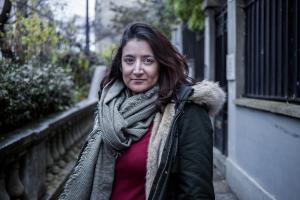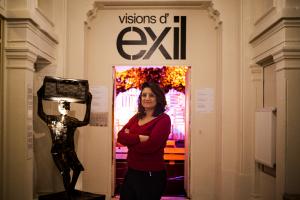Lina ALJIJAKLI
Painter
Lina received a creation grant in partnership with the Atelier des Artistes en Exil.
What is your artistic background ?
I started drawing when I was a child, then I did a foundation course in art in order to start at art school. I started by studying ceramics and I graduated in Syria. Then I went on to become a scenographer, and graduated from the Institute of Dramatic Art in Damascus. There I participated in several group exhibitions (of ceramics and scenography). I also worked as a costume designer and set designer in theatres and on film shoots. In 2010, I came to France to do a Master's degree in theatre studies. I showed in a group exhibition in England in 2011. I produced practically nothing between 2011 and 2017, I had neither the space nor the time. It was instead a moment of research and reflection. In 2017, with the opening of the workshop for artists in exile, I started to create again. Since then, I have exhibited in the showcases of the Ministry of Culture at the Palais Royal and the Palais de la Porte Dorée, I have made puppets for a stop-motion film project, continued with scenography, done art performances in public…
How do you see your profession today ?
I'm still in a period of research, collecting information, news, memories... I have the feeling that I'm still searching and need to enrich myself personally. I see art as a way of testing my personal questions and expressing them. I evolve at the same time as my art, I want to combine the arts that I master, I want to be able to combine art and humanitarianism. For me, art is a tool for expression, for preservation, the possibility of making immaterial things tangible (a memory, a feeling...). It is something that can touch everyone, even those who don't practise it. I do it first of all for myself and then for the public.
How do you see yourself in five years ? In 10 years ?
I'm waiting for life's surprises. Creative moments are surprises for me, I can't wait to see what surprises life has in store for me. I don't have to stop because I don't know what I will be able to produce in 10 years.
This interview was conducted in 2018
Photo credit: Céline Anaya Gautier


